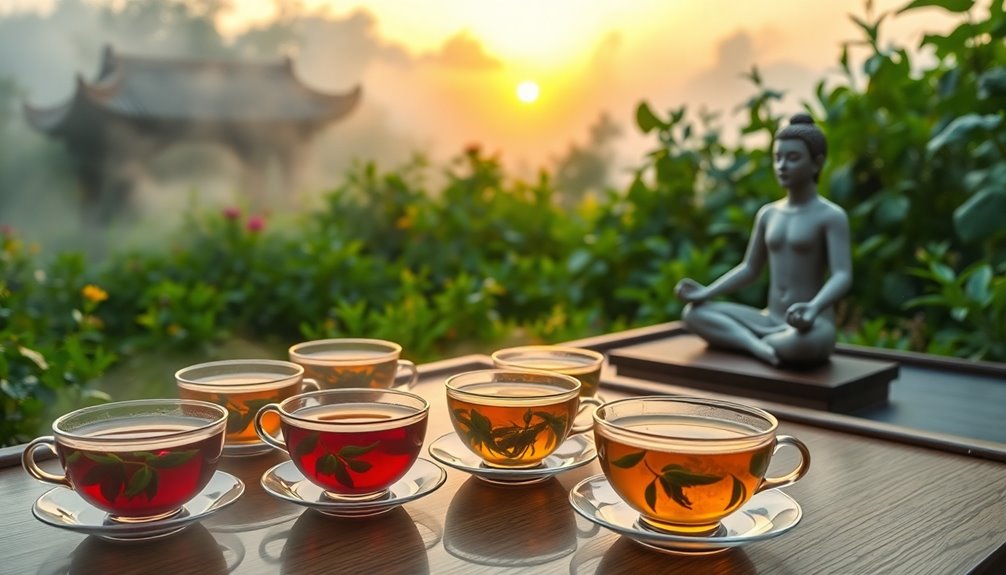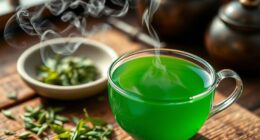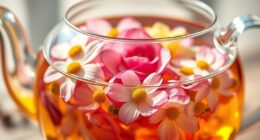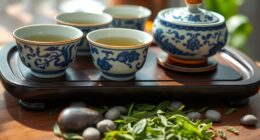To create a meditation-friendly tea space, first, choose a quiet corner that's free from distractions. Make it cozy with comfortable seating, like cushions, and natural light. Add indoor plants for a calming vibe. Select soothing herbal teas, like chamomile or peppermint, which help promote relaxation. Incorporate essential oils for delightful scents that enhance your meditation. Establish a routine to connect your tea ritual with tranquility, focusing on the experience of warmth and aroma. This space will not only help you unwind but also deepen your mindfulness practice. Keep exploring to discover other tips for making it truly special!
Key Takeaways
- Choose a quiet corner with natural light and indoor plants to foster a calming atmosphere for meditation and tea enjoyment.
- Personalize the space with comfortable seating, meaningful decor, and soothing scents from essential oils to enhance relaxation.
- Establish a daily tea routine to create peaceful associations and promote mindfulness during meditation sessions.
- Select caffeine-free herbal teas like chamomile and peppermint for their calming properties and to support a tranquil state of mind.
- Incorporate mindfulness techniques during tea preparation and consumption to deepen your meditation experience and enhance present-moment awareness.
Introduction

Creating a meditation-friendly tea space is all about enhancing your tea-drinking experience through tranquility and mindfulness. You want your space to be a peaceful retreat where you can enjoy your tea while reducing stress.
Start by choosing a dedicated area for your meditation space, free from distractions. This will help you focus and connect more deeply with your tea ritual. Consider incorporating essential oils into your space, as they can promote relaxation and enhance your overall experience. Additionally, placing non-toxic large houseplants in your space can improve air quality and create a soothing atmosphere. You might also want to consider enjoying herbal teas known for their relaxing properties, which can further enhance your meditation practice. Including ingredients like chia seeds in your herbal tea can also support hydration and digestive health during your mindfulness routine.
To boost your mental wellbeing, consider incorporating elements of nature into your meditation. Indoor plants and natural light can create a calm atmosphere that makes your space feel alive and refreshing.
Don't forget to personalize your tea space! Use comforting seating, soothing colors, and decor that holds special meaning for you. These touches turn your space into a welcoming sanctuary. Additionally, creating a tranquil environment can enhance quality sleep, further promoting relaxation and mental clarity.
Tea's Calming Properties Enhance Meditation

Tea's calming properties play a crucial role in enhancing your meditation practice. When you engage in tea meditation, you're not just sipping a warm drink; you're creating a relaxing environment that invites mindfulness.
The act of preparing tea requires your attention, helping you focus on the present moment. This process can calm your mind and set the stage for a deeper meditation session. Additionally, many flower teas, like chamomile and lavender, are renowned for their ability to promote relaxation and improve sleep quality. The ritual of preparing tea often aligns with the principles of a traditional tea ceremony, further enhancing the mindfulness experience. Incorporating essential oils during your tea meditation can amplify the calming effects and elevate your relaxation, as certain oils, like lavender, are known for their mood-enhancing properties.
Tea contains L-theanine, an amino acid that promotes relaxation. It increases alpha brain waves, which are linked to a calm and alert state. Drinking warm tea activates your parasympathetic nervous system, lowering your heart rate and blood pressure, perfect for settling into meditation.
Herbal teas like chamomile and lavender are especially beneficial for their calming properties. They help alleviate anxiety, making it easier for you to connect with your thoughts and emotions. Additionally, the ritual of brewing tea, especially perfecting Earl Grey tea(#), can enhance your focus and deepen your mindfulness practice.
Tea Enhances Mindfulness Practice

A mindful approach to tea drinking can significantly enhance your meditation practice. When you engage in the tea ritual, you create a special space that invites mindfulness into your daily life. Each step of brewing tea—boiling water, watching the leaves unfurl, and savoring the aroma—becomes a moment for reflection and awareness.
As you drink tea, you engage multiple senses: the vibrant colors of the leaves, the warmth of the cup, the rich smell, and the soothing taste. This sensory experience can help you relax and process emotions, which is crucial for mental health. Incorporating tea into your meditation routine can lower stress and anxiety, offering a comforting break from the chaos of everyday life. Additionally, combining tea with essential oils like lavender oil can further enhance relaxation and promote a calming atmosphere. Drinking certain teas, such as celery juice, may also support digestive health and overall well-being. In fact, the antioxidants in tea, particularly catechins, are known to contribute to improved mental clarity, which aligns with the anti-inflammatory properties found in turmeric that can also support emotional balance. Moreover, certain teas are also rich in vitamins A, C, and K, which can contribute to overall health.
Regularly practicing tea meditation builds patience and persistence. Each cup you brew mirrors the natural processes of life, reminding you to slow down and appreciate the moment.
By making tea a part of your mindfulness journey, you not only enhance your meditation practice but also create a lasting habit that enriches your daily experiences.
Tea's Cultural Significance in Meditation

Throughout history, tea has served as a bridge between cultures, often enhancing meditation practices in profound ways. In many Asian traditions, rituals like the Japanese tea ceremony create a mindfulness experience that deepens your spiritual connection. When you prepare tea with intention, you're not just making a drink; you're participating in a practice that promotes mental clarity and reflection. Aromatherapy techniques can also complement this experience, helping to create a serene atmosphere. Additionally, the calming effects of certain essential oils, such as lavender oil, can further enhance relaxation during your tea meditation.
Creating a meditation space will help you embrace these benefits fully. Set up a cozy corner with your favorite tea set, soft cushions, and calming decorations. As you sip your tea, focus on the flavors, the warmth, and the moment. This simple act can turn into a powerful communal activity when shared with friends or family. Additionally, incorporating elements of traditional healing practices can further enhance your meditation experience, connecting you to a deeper sense of community and wellness.
Tea's historical role as a catalyst for enlightenment in Zen Buddhism shows just how important it can be in enhancing meditation. People around the world are recognizing the mental and physical health benefits of tea meditation.
Caffeine's Impact on Relaxation

When creating a meditation-friendly tea space, it's important to consider how caffeine affects your ability to relax. Caffeine, a stimulant found in many teas, can speed up your heart rate and keep you awake. If you drink too much caffeine or have it too close to bedtime, it can disrupt your sleep patterns. This makes it harder for your nervous system to calm down, which is essential for relaxation during meditation. Additionally, incorporating certain herbal alternatives for botox-like effects can enhance your overall mindfulness practice by promoting skin hydration and radiance, which complements a serene environment. Including low carb high protein options in your diet can also support sustained energy levels, making your meditation practice more effective. Moreover, herbal teas like chamomile are known to have calming properties, which can further aid in achieving a tranquil state of mind during meditation. It's beneficial to remember that subconscious power during sleep can also play a role in enhancing your meditation experience.
The half-life of caffeine is about 3 to 7 hours, meaning it can stay in your body long after you've had that cup of tea. To truly enjoy mindfulness and meditation, you might want to limit or avoid caffeinated teas. Recent studies suggest that lower rates of depression may be associated with reduced caffeine consumption, highlighting the benefits of a calming routine.
Instead, think about embracing herbal tea options like chamomile or peppermint. These caffeine-free choices can help promote relaxation and create a calming atmosphere, allowing your mind to focus better during your tea rituals.
Practical Applications

Creating a meditation-friendly tea space involves several practical applications that can significantly enhance your experience.
First, designate a quiet corner in your home just for tea meditation. Make sure this nook is free from distractions so you can focus fully on your practice.
Next, incorporate natural light and indoor plants to boost your mental wellbeing. Studies show that a calming atmosphere can reduce stress and improve your mood.
Choose comfortable seating, like floor cushions or ergonomic chairs, to keep your posture correct while you meditate; this prevents discomfort that could interrupt your peace.
To heighten your sensory experience, use soothing scents from essential oils or herbal teas. These olfactory elements can deepen your meditation practice and help you relax.
Also, establish a routine by spending time in your tea space each day. Setting aside this dedicated time reinforces peaceful associations with your quiet corner and allows your mind to transition into meditation more easily.
When meditation comes, you'll find yourself more relaxed and aware, ready to enjoy the calming ritual of tea.
Enjoy creating a space that's uniquely yours!
Frequently Asked Questions
How Do You Create a Meditation Space?
To create a meditation space, choose a quiet area, personalize it with calming colors and natural elements, eliminate distractions, and add comfort. Incorporate soothing scents and sounds to enhance your meditation experience.
How to Make Tea Meditation?
To make tea meditation, choose a tea that aligns with your mood. Mindfully prepare and savor each sip, reflecting on your thoughts. Pause to process emotions and express gratitude for the experience.
How Do You Make a Safe Space for Meditation?
To create a safe space for meditation, choose a quiet area, eliminate distractions, and keep it tidy. Personalize it with calming elements and establish boundaries to ensure it remains a peaceful refuge for reflection and relaxation.
How Do You Create an Environment for Meditation?
To create an environment for meditation, clear a clutter-free space, use calming colors and natural light, choose comfortable seating, add soothing scents, and limit technology to foster deep relaxation and mental clarity during your practice.
Conclusion
Creating a meditation-friendly tea space can really boost your relaxation and mindfulness. By choosing calming teas and setting up a cozy spot, you invite peace into your practice. Remember to pay attention to the caffeine levels, so you don't feel jittery. Enjoy the cultural connections and soothing rituals that tea offers. With a little planning, you'll have the perfect environment to sip your tea and dive deep into meditation, making your experience even more enjoyable!










